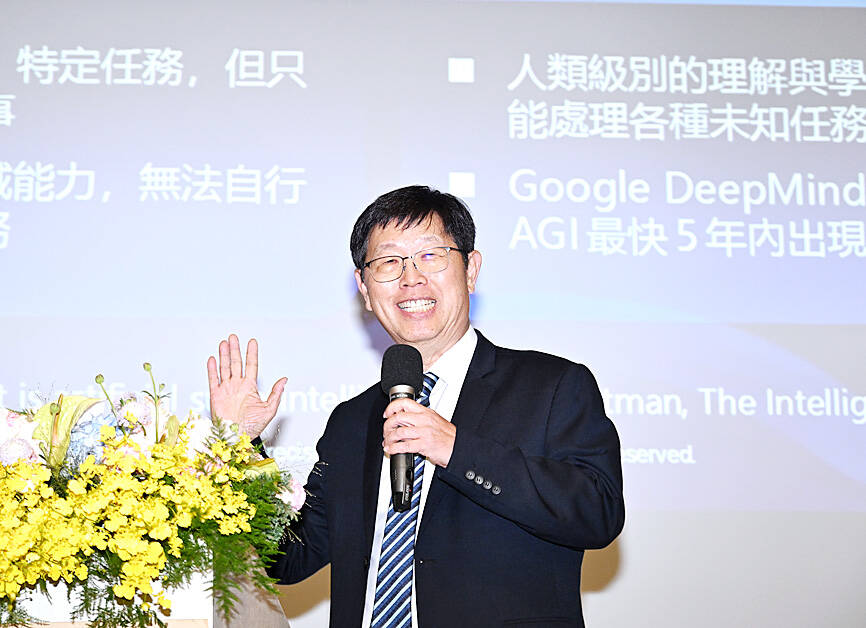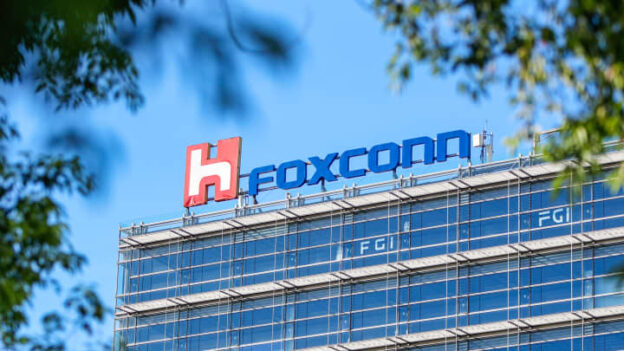Taiwan is an important base for the global development of artificial intelligence (AI) computing and technologies, Hon Hai Precision Industry Co (鴻海精密) chairman Young Liu (劉揚偉) said yesterday at an event organized by the Chinese National Federation of Industries (全國工業總會) in Taipei.
Taiwanese contract manufacturers accounted for 90 percent of the global AI server market, whereas Hon Hai, also known as Foxconn Technology Group (富士康科技集團), supplied at least 40 percent of the market to meet global demand for AI computing, Liu said.
Hon Hai’s AI product lineups cover graphics processing units, servers, and full system assembly and liquid-cooling solutions, he said.

Hon Hai Precision Industry Co chairman Young Liu speaks at an event organized by the Chinese National Federation of Industries in Taipei yesterday.
Photo: Fang Pin-chao, Taipei Times
“One of the biggest advantages of Taiwan’s technology industry is its comprehensive supply chain, in which manufacturers can reach one another within one-and-a-half hours,” he said. “Other countries might have similar supply chains, but their factories are scattered across much larger regions than Taiwan.”
The US$500 billion Stargate Project, backed by OpenAI, Softbank Group Corp and Oracle Corp to build AI infrastructure in the US by 2029, coupled with other AI investments by global tech giants, presents a significant opportunity for Taiwan, Liu said, adding that he is confident in Taiwan’s prowess in AI sector.
Hon Hai’s development plans for the AI sector is comprised of four aspects: vertical integration of hardware and software, building AI data center industry chains, applying AI systems to corporate governance, and building generative-AI platforms for manufacturing, vehicles and cities, Liu said.
“We have discussed with many countries the issue of building AI data centers and related supply chains, and have talked with Minister of Economic Affairs J.W. Kuo (郭智輝) about helping our Taiwanese peers expand their businesses in these countries,” he said.
Hon Hai is also striving to develop smart manufacturing, smart electric vehicles (EVs) and smart cities based on generative AI technologies, following the company’s announcement last year that it would team up with Nvidia Corp to build an advanced computing center in Kaohsiung to support the initiatives, he said.
For the smart EV sector, the company plans to use over-the-air programming, generative AI-based engines and humanoid AI autonomous systems for vehicles, Liu said.
Analysts generally do not have a positive outlook for autonomous vehicle systems, as past development heavily relied on training using vast amounts of images, often leading to misjudgements in unfamiliar scenarios and resulting in accidents, he said.
“Now that generative AI systems are being applied to vehicles, they can intelligently identify each situation, so we believe humanoid AI autonomous systems should be adopted in the EV industry,” he added.
Talking to reporters after the event, Liu said that US President Donald Trump’s tariff policy would affect global trade, which in turn would also impact the company’s global operations.
As Hon Hai had planned its global deployment early, the effect would be relatively limited, he said.
Nevertheless, Liu said he supports the free flow of goods, adding that the best scenario would be an “open” one.
https://www.taipeitimes.com/News/biz/archives/2025/04/18/2003835362





